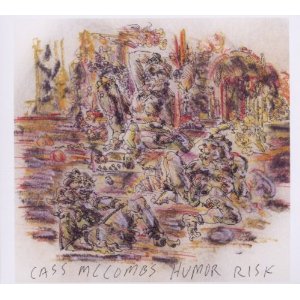An unwritten rule among singer-songwriters is that one can only make a single truly confessional album in your career before it becomes indulgent and gratuitous. Similarly, you can only really make one album of bleak fatalism and existential woe before it too begins to bore listeners. Cass McCombs’ last album WIT’S END, released earlier this year, saw him in the role of the comic gravedigger, exploring surreal desperation and existential woe with his slow and mournful songs, yet with the familiar gallows humour that has been with him since he began his career in 2002. Not that it didn’t have its moments of extreme beauty; if for nothing else, the album can be remembered for the bass clarinet on ‘Memory’s Stain’ – among the most lovely instrumental passages by anyone this year.
He has risen, as he had to, out of that misery with Humor Risk (a reference, at least a little bit you would think, to the 1921 Marx Bros film) and if not exactly embraced the sunshine, allowed the energy of pop music and a true sense of playfulness to return.
To release two albums in the space of a few months is, though, unusual for him. McCombs has always given the impression of being painfully deliberate with what he releases, as cautious with what he puts his name to as he is with the media. However, you always suspected he may have a large backlog of songs that may never be released or even recorded, partly due to the fact McCombs seems a stickler for the concept of an album that is well-rounded thematically – songs that don’t fit into something wider may be jettisoned, and it just so happens that in 2011 he’s managed to come up with two musical personas, therefore two albums.
In short, fun is back on Humor Risk. And given how that sort of thing has gone for him in the past is likely to provoke a mixed reaction. Not since 2008’s Dropping The Writ has McCombs been in this mode, and that record was probably his least well-received LP critically – see the rather brutal Spotify review of the firmly autobiographical opener ‘Lionkiller’. Dropping The Writ is in fact McCombs’ best album, as it is the one where you feel he found the perfect balance between expressing the tragic-comic foibles of his own existence and the more compassionate treatment he gives his songs’ invented characters. He has largely done the same thing here.
First track ‘Love Thine Enemy’ is actually not dissimilar to the divisive ‘Lionkiller’. Propulsive, a rare excursion with electric guitar and with lyrics that seem deliberately incongruous and childlike for the sake of rhyme, this is the ultimate expression of the louder side of McCombs. There is wit and a certain swagger that recalls early rock and roll, this quality resurfacing in the brilliant ‘Mystery Mail’, an intriguing song (reminiscent of ‘When The Bible Was Wrote’ from 2003 album A) that keen McCombs fans will recognise as containing some of his cryptic biographical clues, with lyrical references to the peripatetic and mystical alter-ego he created on Dropping The Writ.
‘The Same Thing’, meanwhile, can count among his best ever songs – a neatly arranged and simple example of his astounding melodic gifts. Even its message is uncharacteristically straightforward. ‘Robin Egg Blue’ is along the same lines.
There is also an added vitality to his vocals. Instead of the funereal groan of WIT’S END, there is more body and enthusiasm – long has he been regarded as having an Elliot Smith-style earnestness to his singing, but in truth he has more range than that, and an attractive case of multiple vocal personalities. As well as the zest of ‘Love Thine Enemy’ and ‘The Living Word’ there is the dour singer on ‘Mariah’ and ‘To Every Man His Chimera’, the record’s two nods to the darkness of his previous album.
And somehow it is in his vocals that Cass’s mood can often be gleaned, rather than the often obtuse and riddle-like nature of those lyrics. In a rare interview promoting WIT’S END he said he wondered if "someone who can really sing would find my songs", suggesting he was stretching himself too far with those uncompromising compositions – as well as the fact he sees his own emotional investment in them as not essential to fulfilling their potential. And here’s the difference with Humor Risk. He sounds so much more comfortable now that the songs are meant to fit with his stirring delivery, and that he has allowed variety and erraticness of feeling back into his work. It’s difficult to say Humor Risk is better than WIT’S END, but it is certainly its perfect counterpart.


